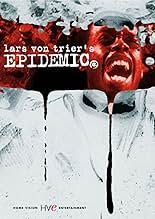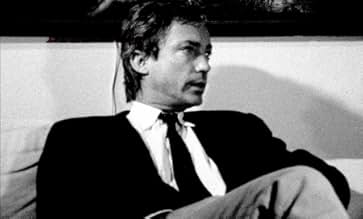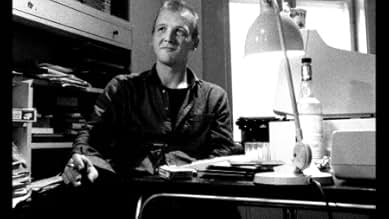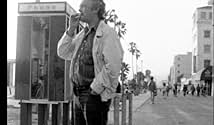IMDb RATING
5.9/10
6.5K
YOUR RATING
A director and screenwriter pen a script and, in the process, blur the line between fiction and reality.A director and screenwriter pen a script and, in the process, blur the line between fiction and reality.A director and screenwriter pen a script and, in the process, blur the line between fiction and reality.
- Awards
- 1 nomination total
- Director
- Writers
- All cast & crew
- Production, box office & more at IMDbPro
Featured reviews
I like Von Trier's films and this one and "The Idiots" seem to me the ones in which he achieves through both the way they are shot and the plot in itself, a high quality of personal artistic expression.
Concentrating on "Epidemic", I think the contrast between the black and white parts and the "story" is intriguing and effective, visually disturbing and helping to create the symbolic meaning the viewer could take from this movie.
To me, beyond more evident interpretations about predestination, Dreyer-like bad and evil explanations, I believe Von Trier -with the help of, for instance, bleak houses, rundown sourroundings and disease- tries to tell us that the world we're living is infected by a growing disease, living its marks in EACH ONE OF US, making Europe in general a dull and heartless place to live, a world killing us very slowly and with it our soul, our sensibility and our ability to feel. Like the final song : "we all fall down".
Against the complacency and cynism of much of the cultural expression nowadays, I think Von Trier's work is an exemple. That is why I recommend "Epidemic" to IMDB users.
Concentrating on "Epidemic", I think the contrast between the black and white parts and the "story" is intriguing and effective, visually disturbing and helping to create the symbolic meaning the viewer could take from this movie.
To me, beyond more evident interpretations about predestination, Dreyer-like bad and evil explanations, I believe Von Trier -with the help of, for instance, bleak houses, rundown sourroundings and disease- tries to tell us that the world we're living is infected by a growing disease, living its marks in EACH ONE OF US, making Europe in general a dull and heartless place to live, a world killing us very slowly and with it our soul, our sensibility and our ability to feel. Like the final song : "we all fall down".
Against the complacency and cynism of much of the cultural expression nowadays, I think Von Trier's work is an exemple. That is why I recommend "Epidemic" to IMDB users.
Another entry in my search to see a bunch of films about disease outbreaks, "Epidemic" is conceptually intriguing, but the actual execution is dreadful. It's amateurish, and Lars von Trier and Niels Vørsel, scenarists within and without the film, seem to have approached the entire thing as a joke; the end result being that the film itself is one. And, for crying out loud, take that damn red watermark of a title off the screen already! Seriously, the title, "Epidemic," along with an e in a circle, is in the upper left side of the image for most of the picture--and in red in an otherwise black-and-white film. I thought there was something wrong with the DVD or my home-viewing equipment--I'm still not entirely sure, because it makes no sense why the title would remain there for the rest of the whole movie. The lousy lighting and noisy photography, from what mostly seems to be 16mm film, is rather a blessing in this regard, as it sometimes obscures the ever present title in indiscernible darkness. Besides that, I also wanted to smack the smirks off their faces most of the time. Stop laughing, guys; none of this is amusing except, perhaps, for part of the ending. Aside from the Grand Guignol, my favorite part has the screenwriters' boss deploring the two's lack of a full script, for which they were hired, and deploring their film's ending, which he says is "pathetic" at best.
What there is is a skeleton of a script and a plotline painted on a wall. Literally, this is what is shown in the film for the writing of the film-within-the-film, also titled "Epidemic," and it's believable that's all they really did write for this entire film. I believe they mention this lack of planning in the DVD commentary, on which the two otherwise spend most of the time giggling at themselves giggling in the stupid movie. It's obnoxious. Hard to believe one of them, von Trier, went on to be the most famous Scandinavian filmmaker since Ingmar Bergman. Regardless, the premise of the thing was promising, of the film-within-the-film infecting the outer narrative--the movie as monster, as the source of the epidemic--as the writers in the outer one have likewise been infecting the inner film. These sort of meta narratives are catnip to me, so one needs to go out of their way or, rather in this case, not go out of their way at all, to dissuade me of it.
The film even begins with what seems to have been a waste of a good pun by not making clear that their script is lost to some sort of computer "virus," with the other sort of virus deadly to people occupying the film they decide to write after losing their previous effort, which apparently was so bad they can't even remember it so as to re-write the thing. From there, we get a shaggy-dog story--like the first car ride that goes nowhere, as do several of the film's other rambling detours. The texting while driving gag--with a typewriter (this being 1987) isn't bad. At least Udo Kier's scene is an interesting telling of his birthday, too, but otherwise we get pretentious wine tasting, a story of Vørsel's creepy correspondence with teenage girls from Atlantic City, and a woman hypnotized into the film-within-the-film who bawls and screams over how awful "Epidemic" is. I didn't think it was that bad, but it was a chore to finish it.
What there is is a skeleton of a script and a plotline painted on a wall. Literally, this is what is shown in the film for the writing of the film-within-the-film, also titled "Epidemic," and it's believable that's all they really did write for this entire film. I believe they mention this lack of planning in the DVD commentary, on which the two otherwise spend most of the time giggling at themselves giggling in the stupid movie. It's obnoxious. Hard to believe one of them, von Trier, went on to be the most famous Scandinavian filmmaker since Ingmar Bergman. Regardless, the premise of the thing was promising, of the film-within-the-film infecting the outer narrative--the movie as monster, as the source of the epidemic--as the writers in the outer one have likewise been infecting the inner film. These sort of meta narratives are catnip to me, so one needs to go out of their way or, rather in this case, not go out of their way at all, to dissuade me of it.
The film even begins with what seems to have been a waste of a good pun by not making clear that their script is lost to some sort of computer "virus," with the other sort of virus deadly to people occupying the film they decide to write after losing their previous effort, which apparently was so bad they can't even remember it so as to re-write the thing. From there, we get a shaggy-dog story--like the first car ride that goes nowhere, as do several of the film's other rambling detours. The texting while driving gag--with a typewriter (this being 1987) isn't bad. At least Udo Kier's scene is an interesting telling of his birthday, too, but otherwise we get pretentious wine tasting, a story of Vørsel's creepy correspondence with teenage girls from Atlantic City, and a woman hypnotized into the film-within-the-film who bawls and screams over how awful "Epidemic" is. I didn't think it was that bad, but it was a chore to finish it.
EPIDEMIC (Lars von Trier - Demark 1987).
Von Trier's second feature reveals his obsessions with cinema, with his self-imposed limitations on film-making in many ways foreshadowing Von Trier's later obstructions upon Jorgen Leth in THE FIVE OBSTRUCTIONS (2003).
Essentially a film about his own obsessions, or a grand parody on horror, as some suggested. Von, Trier, frustrated by the delay of his never realized project, "The Grand Mal", about two gangster families in divided Berlin, made a bet with film consultant Claes Kastholm of the Danish Film Institute, claiming that he could make a feature film for one million Danish kroner. Resulting partly in an amateur movie about a film director and a scriptwriter who must write a new manuscript in five days, interspersed with scenes from the film they are working on - about a young idealistic doctor in the late 20th century, who tries to fight an epidemic, but only manages to spread it further. The film culminates with the outbreak of a deadly plague, not in the past but in the present. Throughout the film, Von Trier shows his fascination with Germany, for example, during a ride through the "Ruhrgebiet", the industrial core of Europe, or the world, at least during the '80s.
Camera Obscura --- 8/10
Von Trier's second feature reveals his obsessions with cinema, with his self-imposed limitations on film-making in many ways foreshadowing Von Trier's later obstructions upon Jorgen Leth in THE FIVE OBSTRUCTIONS (2003).
Essentially a film about his own obsessions, or a grand parody on horror, as some suggested. Von, Trier, frustrated by the delay of his never realized project, "The Grand Mal", about two gangster families in divided Berlin, made a bet with film consultant Claes Kastholm of the Danish Film Institute, claiming that he could make a feature film for one million Danish kroner. Resulting partly in an amateur movie about a film director and a scriptwriter who must write a new manuscript in five days, interspersed with scenes from the film they are working on - about a young idealistic doctor in the late 20th century, who tries to fight an epidemic, but only manages to spread it further. The film culminates with the outbreak of a deadly plague, not in the past but in the present. Throughout the film, Von Trier shows his fascination with Germany, for example, during a ride through the "Ruhrgebiet", the industrial core of Europe, or the world, at least during the '80s.
Camera Obscura --- 8/10
Epidemic (1987), directed by Lars von Trier, is a meta-cinematic exploration of the blurred line between fiction and reality. The film follows a director and screenwriter who, while working on a script about a plague, find themselves caught up in a real-life epidemic, mirroring the events they are writing. This film is a challenging and unconventional piece of work, characteristic of von Trier's early style, marked by its fragmented narrative and philosophical underpinnings.
The performances are fittingly restrained, with Allan De Waal and Ole Ernst bringing a sense of detachment and intellectual depth to their characters, reflecting the film's thematic concerns. The film's low-budget aesthetic, with shaky handheld camerawork and raw sound design, serves to reinforce the sense of chaos and uncertainty that permeates the narrative. It's a deliberate stylistic choice that enhances the surreal, almost documentary-like atmosphere, but it may be off-putting to some viewers who prefer more polished filmmaking.
Von Trier's direction is methodical, and while the premise of the film offers intriguing possibilities, the execution can feel disjointed and unclear at times. The dialogue often veers into abstract territory, and the narrative structure is fragmented, leaving viewers to piece together the meaning behind the events. The film's slow pace, combined with its minimalistic style, can make it feel like a deliberately inaccessible work, challenging the audience's patience.
Epidemic is a film that operates on multiple levels, blending political, artistic, and existential commentary with a quasi-documentary style. While it offers some thought-provoking moments, it struggles to maintain coherence and impact over its runtime. It is best suited for those interested in avant-garde cinema or those looking to delve into the early works of Lars von Trier, but casual viewers may find it frustrating.
Rating: 6/10. A provocative, if uneven, exploration of the intersection between art, reality, and societal collapse.
The performances are fittingly restrained, with Allan De Waal and Ole Ernst bringing a sense of detachment and intellectual depth to their characters, reflecting the film's thematic concerns. The film's low-budget aesthetic, with shaky handheld camerawork and raw sound design, serves to reinforce the sense of chaos and uncertainty that permeates the narrative. It's a deliberate stylistic choice that enhances the surreal, almost documentary-like atmosphere, but it may be off-putting to some viewers who prefer more polished filmmaking.
Von Trier's direction is methodical, and while the premise of the film offers intriguing possibilities, the execution can feel disjointed and unclear at times. The dialogue often veers into abstract territory, and the narrative structure is fragmented, leaving viewers to piece together the meaning behind the events. The film's slow pace, combined with its minimalistic style, can make it feel like a deliberately inaccessible work, challenging the audience's patience.
Epidemic is a film that operates on multiple levels, blending political, artistic, and existential commentary with a quasi-documentary style. While it offers some thought-provoking moments, it struggles to maintain coherence and impact over its runtime. It is best suited for those interested in avant-garde cinema or those looking to delve into the early works of Lars von Trier, but casual viewers may find it frustrating.
Rating: 6/10. A provocative, if uneven, exploration of the intersection between art, reality, and societal collapse.
The idea of the film is great. Mixing the creation of a movie and his viewing. It's done in a very ambitious way, incredibly sophisticated and elegant when we know the budget who was assigned to the movie.
A lot of scenes are incredible, specially the one who shows the contamination of the priest, adding a reflection on the condition of the black man. Obviously the last scene is one of the most incredible things I've seen on a screen, but we can doubt the mental health of Von Trier and his crew. However maybe it's the reason he's so good...
I didn't like a few things. I think there is too much time about the creation of the movie, a few ridiculous and unappropriated moments as the story of the American letters of Niels
A lot of scenes are incredible, specially the one who shows the contamination of the priest, adding a reflection on the condition of the black man. Obviously the last scene is one of the most incredible things I've seen on a screen, but we can doubt the mental health of Von Trier and his crew. However maybe it's the reason he's so good...
I didn't like a few things. I think there is too much time about the creation of the movie, a few ridiculous and unappropriated moments as the story of the American letters of Niels
Did you know
- Crazy creditsThe film's title appears in red letters in the upper left corner of the screen for the entire length of the film.
- ConnectionsFeatured in The Making of 'Europa' (1991)
- SoundtracksTannhäuser (The Overture)
Composed by Richard Wagner
- How long is Epidemic?Powered by Alexa
Details
Box office
- Gross worldwide
- $938
- Runtime
- 1h 46m(106 min)
- Color
- Sound mix
- Aspect ratio
- 1.66 : 1
Contribute to this page
Suggest an edit or add missing content



















